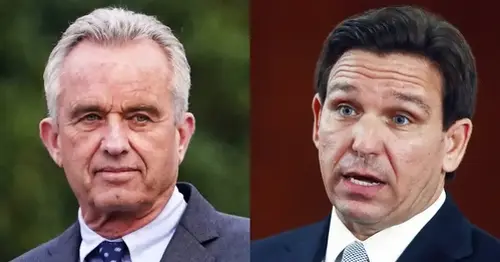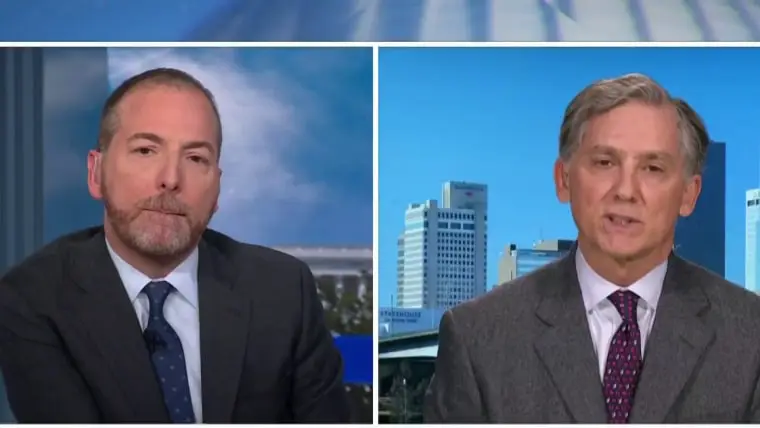
DeSantis and RFK Jr. misconstrue FedNow and digital dollar plans
As the Federal Reserve looks to modernize banking, two potential 2024 presidential candidates have accused the central bank of seeking to use a proposed digital dollar to “control” Americans’ finances, although Fed officials have committed to no such plans.
Florida Gov. Ron DeSantis alleged last weekend that a Fed-made digital U.S. dollar would let the government block transactions like buying a rifle or filling up with “too much gas.”
He added, speaking at a Pennsylvania conference on Saturday, “They are going to try to impose an ESG agenda,” referring to private sector policies aimed at advancing environmental, social and governance principles, which conservative lawmakers across the country have been pushing to curb.
“It is ceding the power of our financial freedom to a central bank which does not have our interests at heart,” DeSantis said.
The Republican governor, who has been widely floated as a potential primary rival to former President Donald Trump, has introduced legislation in Florida seeking to ban the use of any Fed-issued digital currency in the state and has called on other states to do the same.
The Fed is readying its “FedNow” initiative, which aims to shorten the time it takes for banks to send funds to other banks, for a planned July rollout. Separately, it has also been exploring the possibility of issuing a digital version of the dollar that households could readily use instead of cash. The central bank-issued currency would be used in digital wallets offered by the private sector, including by consumer lenders.
The Fed is exploring the idea to keep up with countries that have moved to implement their own digital currencies, such as China. But officials have made clear that they are not committed to following through on issuing one. And Fed Chair Jerome Powell has said that the central bank wouldn’t issue any consumer-facing digital dollar without authorization from Congress.
“We haven’t decided that this is something that the financial system in the country would want or need, so that’s going to be very important,” Powell told Congress on March 8.
Last year, the Fed issued a white paper analyzing the potential pros and cons of issuing a digital dollar. The paper makes no mention of any intention to throttle transactions.
DeSantis’ comments came within days of remarks by anti-vaccine activist Robert F. Kennedy Jr., who tweeted Wednesday that a Fed-issued currency would “allow the government to surveil all our private financial affairs … enforce dollar limits on our transactions restricting where you can send money … [and] freeze your assets or limit your spending to approved vendors if you fail to comply with arbitrary diktats, i.e. vaccine mandates.”
Kennedy, who filed paperwork this week to run for president as a Democrat, has been a longtime opponent of Covid-19 vaccination requirements. He publicly apologized last year for comments suggesting that Anne Frank had more freedom in hiding from the Nazis than people facing U.S. vaccination policies during the pandemic.
In his remarks Wednesday, Kennedy referred to a “‘FedNow’ Central Bank Digital Currency (CBDC),” appearing to conflate the two plans. As a bank-to-bank initiative, the FedNow service wouldn’t directly impact users’ transactions. It is designed, for example, to speed up how quickly an employer’s bank sends payroll direct deposits to employees’ bank accounts.
A Fed spokesperson declined to comment on the two politicians’ allegations but clarified that FedNow is not related to any potential central bank-issued digital currency.
Later Friday, the central bank tweeted information about FedNow, emphasizing that the service “is neither a form of currency nor a step toward eliminating any form of payment, including cash.”
Aaron Klein, a senior fellow at the Brookings Institution, pointed out that existing laws around digital payments systems require financial services companies to collect and report transaction data to fight money laundering and terrorism financing.
“What [DeSantis] is getting wrong is this idea that there’s more reporting if there’s a central bank digital currency than if it’s a commercial bank digital currency,” Klein said.
Asked about the source of claims that a digital dollar would be used to limit purchases of guns or gas, DeSantis press secretary Bryan Griffin said, “The track record of the establishment throughout COVID and under this administration speaks for itself and leaves plenty of room for concern. Obviously, centralized currency provides an avenue for the controlling entity to push an agenda,” he said, citing China.
Representatives for Kennedy declined to comment.
‘I don’t endorse, personally, bitcoin being currency,’ House Republican says
Jan. 13, 202308:25In recent months, some far-right forums and figures have pushed the idea that the U.S. would seek to phase out or ban paper currency in coming years, replacing it with a digital currency that would prevent certain people from purchasing specified goods such as weapons, gas-powered cars or meat.
China’s digital currency project has featured prominently in such arguments, with some related conspiracy theories suggesting a government push to develop a Chinese-style social credit system. In some quarters, cryptocurrency enthusiasts have suggested that decentralized digital tokens could serve as a defense against state-backed digital currencies.







